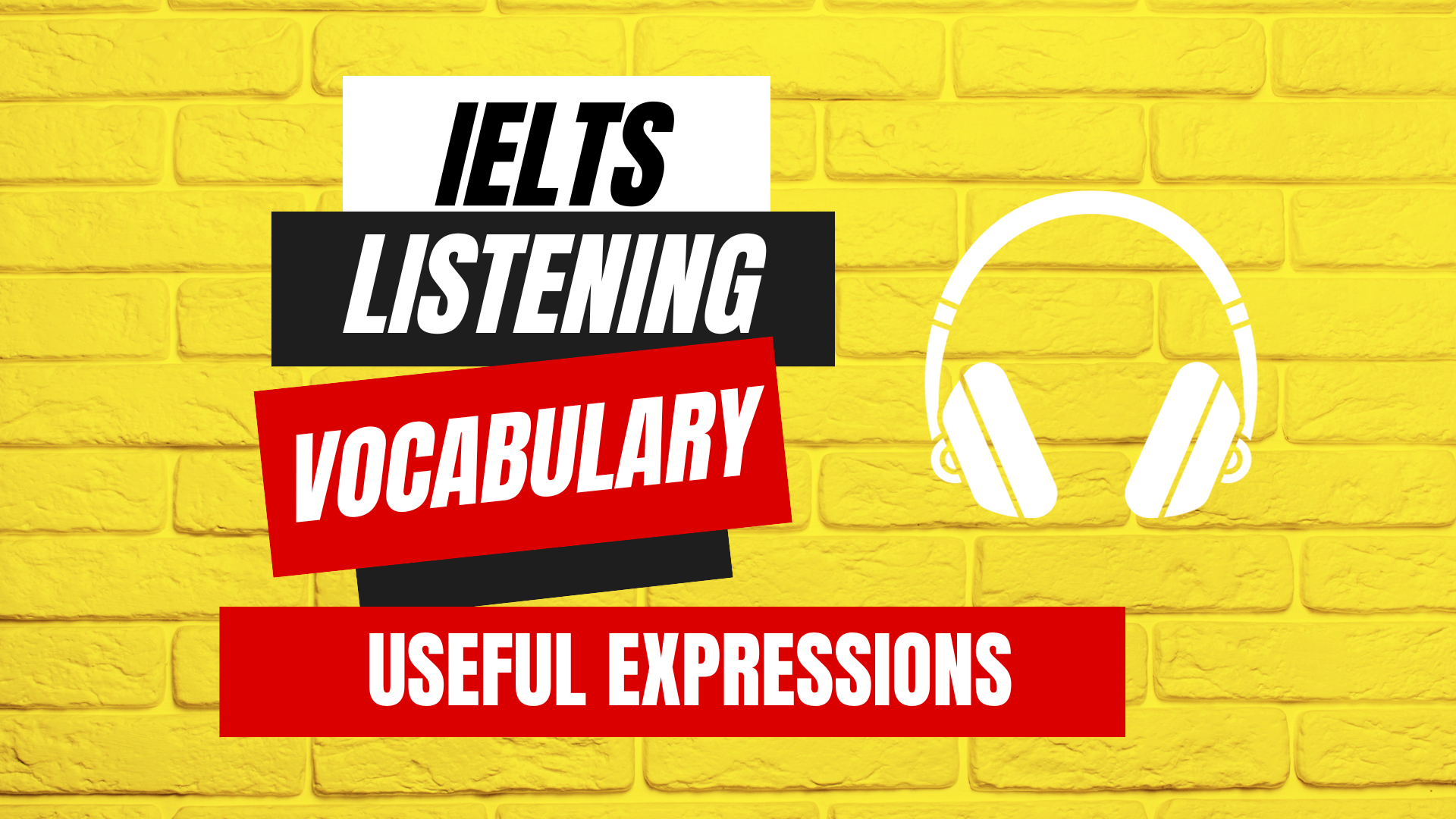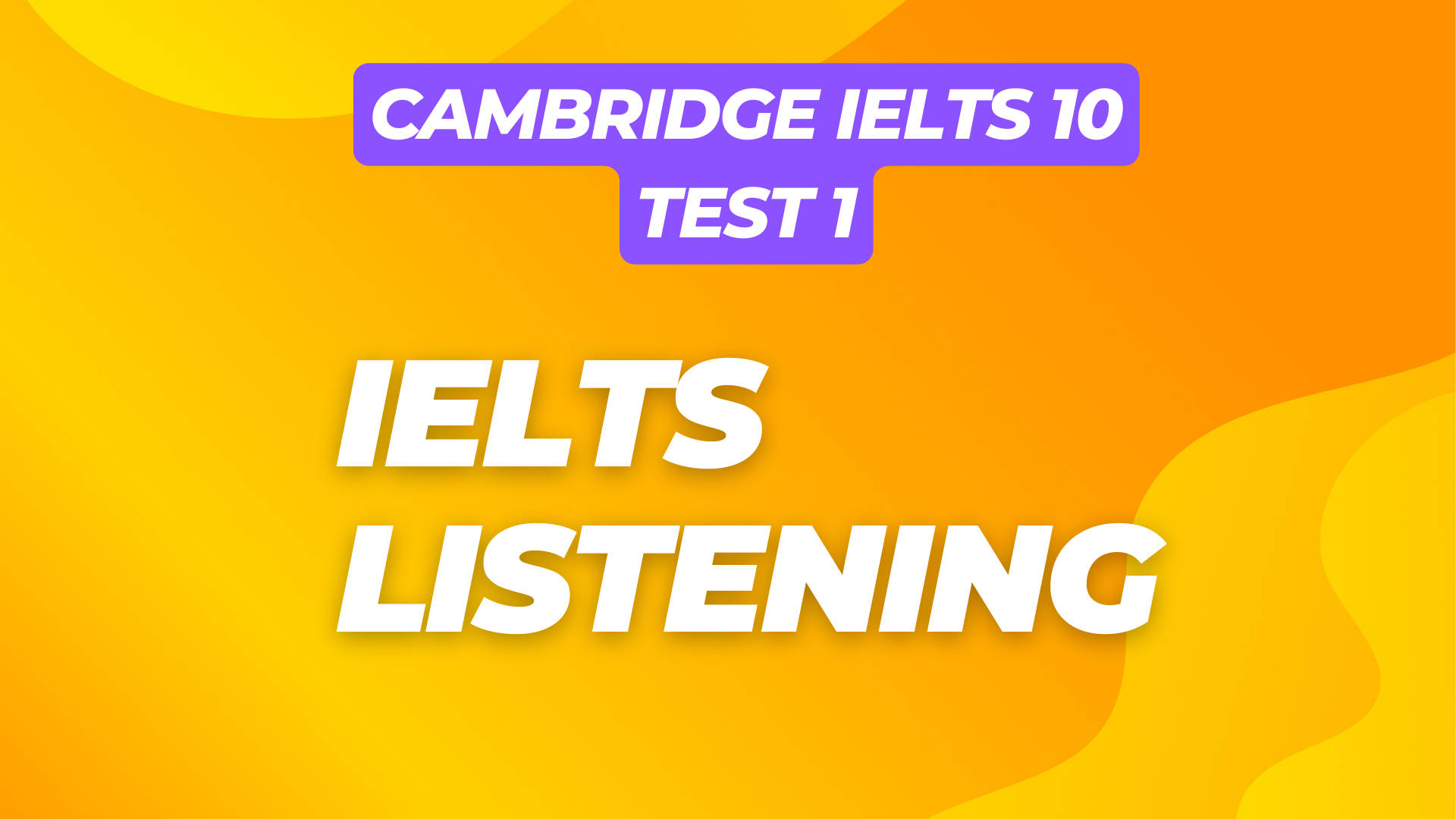Dưới đây là các từ vựng được rút ra từ bài IELTS LISTENING, trong sách CAMBRIDGE IELTS 8 – Test 2 mà bạn nên ghi chép lại để học.
SECTION 1
1. take out insurance: mua hợp đồng bảo hiểm
2. make a claim: đòi hỏi một số tiền bảo hiểm, đòi bồi thường
3. suburb (n) /ˈsʌbɜːrb/: ngoại ô; ngoại thành
4. point of origin (noun phrase): điểm xuất phát, điểm gốc, điểm gửi (hàng)
Example:
The package’s point of origin was somewhere in the U.S.
5. unusable (adj) /ˌʌnˈjuːzəbl/: không thể dùng được
6. quote (v) /kwəʊt/ (C2) = to give a price (định giá, đưa ra mức giá)
Example:
They quoted us $100,000 for building a patio.
7. cover sth (v) /ˈkʌvər/ (C1) = to be or provide enough money to pay for sth (đủ để bù đắp lại được, đủ để trả, cung cấp đủ tiền để thanh toán)
COLLOCATIONS:
cover the cost
cover expenses/fees
SECTION 2
8. complex (n) /ˈkɑːmpleks/: khu liên hợp
COLLOCATIONS:
a sports/leisure/shopping complex: một khu liên hợp thể thao/giải trí/mua sắm
9. remit (n) /ˈriːmɪt/, /rɪˈmɪt/: lĩnh vực hoạt động (cái mà ai đó có trách nhiệm hoặc có sự kiểm soát)
COLLOCATIONS:
outside the remit of sb/sth
within the remit of sb/sth
10. giant (adj) /ˈdʒaɪənt/ = very large
11. the grazing area: khu vực đồng cỏ (cho bò, cừu ăn)
the rare breeds /briːd/: nòi, giống hiếm
the circular area: khu vực hình tròn
the marsh area: khu vực đầm lầy
12. rear (v) /rɪr/ = to look after a person or animal until they are fully grown (nuôi nấng, chăm sóc cho đến khi trưởng thành)
13. out of bounds (to/for sb) (idiom) = if a place is out of bounds, people are not allowed to go there (không được phép đi vào)
Example:
The path by the railway line is out of bounds to walkers.
14. poultry (n) /ˈpəʊltri/: gia cầm
15. lose sight of sth (idiom) (C2) = to forget or ignore an important aspect of sth because you have other things to think about (quên hoặc phớt lờ điều gì)
Example:
We must not lose sight of our goal.
16. gene pool (n) /ʤiːn puːl/ = all the genes of a particular group of people or animals: vốn gen (là tập hợp tất cả các gen và những alen của chúng trong một quần thể sinh vật)
17. spectacular (adj) /spekˈtækjələr/ (B2) = very impressive
Example:
They have revamped the business with spectacular success.
18. in full blossom /ˈblɑːsəm/ (idiom) = with the flowers fully open (với hoa nở rộ)
19. all year round (idiom) = throughout the entire year (trong suốt cả năm)
Example:
It’s warm enough to swim all year round.
20. consult sb (v) /kənˈsʌlt/ (B2): hỏi ý kiến; tra cứu, tham khảo (ai)
Example:
I made the decision without consulting my parents.
21. orchard (n) /ˈɔːrtʃərd/: vườn cây ăn quả
22. browse (v) /braʊz/ (B2) = to look at a lot of things in a shop rather than looking for one particular thing (xem lướt qua nhiều thứ trong shop)
23. diversify (v) /daɪˈvɜːrsɪfaɪ/ = If a business diversifies, it starts making new products or offering new services (đa dạng hóa sản phẩm, dịch vụ)
Example:
Farmers are being encouraged to diversify into new crops.
SECTION 3
24. biologist (n) /baɪˈɑːlədʒɪst/: nhà nghiên cứu về sinh vật học
25. the quarantine service /ˈkwɔːrəntiːn/ /ˈsɜːrvɪs/: dịch vụ kiểm soát, kiểm dịch
26. regulate (v) /ˈreɡjuleɪt/ (C1) = to control sth, especially by making it work in a particular way (kiểm soát)
Example:
Parents should regulate how much TV their children can watch.
27. introduce sth into sth (v) (B2) = to bring a plant, an animal or a disease to a place for the first time (mang cây trồng, động vật hoặc bệnh tật đến nơi nào đó lần đầu tiên)
Example:
Diseases were introduced into the environment by settlers.
28. eradicate sth (v) /ɪˈrædɪkeɪt/ (C2) = to destroy or get rid of sth completely, especially sth bad (loại bỏ, phá hủy hoàn toàn, diệt trừ tận gốc)
Example:
Her ambition is to eradicate poverty in her community.
29. infest (v) /ɪnˈfest/ = (of animals and insects that carry disease) to exist in large numbers in a particular place, often causing a problem (tràn vào quấy phá, tràn vào phá hoại )
=> Từ này thường dùng dưới dạng bị động: be infested with sth
Example:
The kitchen was infested with cockroaches.
30. microscopic creature (n) /ˌmaɪkrəˈskɑːpɪk/ /ˈkriːtʃər/ : sinh vật, loài vật cực kỳ nhỏ và khó nhìn thấy nếu không có kính hiển vi
31. wipe sth out (phrasal verb) (C2) = to destroy or remove sth completely (phá hủy hoặc loại bỏ hoàn toàn thứ gì)
Examples:
Whole villages were wiped out by the floods.
Nothing could wipe out her bitter memories of the past.
32. pollinate (v) /ˈpɑːləneɪt/: thụ phấn
pollination (n) /ˌpɑːləˈneɪʃn/: sự thụ phấn
33. devastating (adj) /ˈdevəsteɪtɪŋ/ (C2) = causing a lot of damage or destruction (gây ra nhiều hư hại, gây phá hủy)
COLLOCATIONS:
devastating consequences/effects: những hậu quả/ảnh hưởng gây ra nhiều hư hại
Example:
Violent arguments have a devastating effect on marriages.
34. flora (n) /ˈflɔːrə/ = all the plants of a particular place (tất cả các cây của một vùng đất)
35. sting (v) => stung (V3): châm, chích, đốt
36. digest (v) /daɪˈdʒest/, /dɪˈdʒest/: tiêu hoá, làm tiêu hoá (thức ăn)
indigestible (adj) /ˌɪndɪˈdʒestəbl/: khó tiêu hóa, không thể tiêu hoá
37. bring up sth (phrasal verb) = to vomit: nôn, mửa, tống (thức ăn… từ dạ dày ra)
38. cough sth up (phrasal verb) /kɔːf/: nhả ra thứ gì bằng việc ho, ho mà khạc ra thứ gì
39. pellet (n) /ˈpelɪt/: viên, hòn, viên vê nhỏ
40. track sb/sth down (phrasal verb) (C2) = to find sb/sth after searching in several different places (tìm thấy ai/thứ gì sau khi kiếm chúng ở nhiều nơi)
Examples:
I finally managed to track down the book I wanted in a shop near the station.
I don’t know where that old story came from, I’ve never been able to track it down.
41. pull sth apart (phrasal verb): phá hủy thứ gì thành những miếng nhỏ
42. scrunch sth up (phrasal verb) /skrʌntʃ/: ép và xoắn thứ gì thành những vật tròn nhỏ
43. insight (n) (B2) /ˈɪnsaɪt/: sự nhìn thấu được bên trong sự vật, sự hiểu thấu được bên trong sự vật; sự hiểu biết sâu sắc
44. conduct sth (v) /kənˈdʌkt/: tiến hành (một cuộc nghiên cứu, phỏng vấn, chiến dịch …)
SECTION 4
45. practice (n) /ˈpræktɪs/ = the work of some professional people such as doctors, dentists and lawyers or the place where they work: sự hành nghề (của bác sĩ, nha sĩ, luật sư); phòng khám bệnh, phòng luật sư
46. rationale (n) /ˌræʃəˈnæl/ = the principles or reasons which explain a particular decision, course of action, belief, …(nguyên tắc, lý do căn bản)
47. approach sb (v) /əˈprəʊtʃ/ (B2) = to speak to sb about sth, especially to ask them for sth or to offer to do sth (tiếp xúc/nói chuyện với ai đó để đặt vấn đề)
Examples:
She was often approached for help and advice
The charity approached several stores about giving food aid.
48. exclude sb/sth (from sth) (v) /ɪkˈskluːd/ (B2) = to prevent sb/sth from entering a place or taking part in sth (ngăn cản/không cho phép ai tham gia vào hoạt động nào đó)
Example:
The pupils we permanently exclude from school are damaged children.
49. counteract sth (v) /ˌkaʊntərˈækt/ = to reduce the effect of sth bad by doing sth that produces an opposite effect (làm giảm ảnh hưởng của thứ gì bằng việc chống lại nó)
Examples:
These exercises aim to counteract the effects of stress and tension.
These new energy technologies are aimed at counteracting the effects of global warming.
50. collate sth (v) /kəˈleɪt/: kiểm tra và so sánh; đối chiếu
51. propose (v) /prəˈpəʊz/ (B2): đề nghị, đề xuất, đưa ra
Example:
He proposed that the UN should take action immediately to keep a lid on global warming.
=> keep a lid on sth (idiom): kiểm soát hoặc kiềm chế thứ gì
52. far-reaching (adj) /ˌfɑːr ˈriːtʃɪŋ/: có nhiều ảnh hưởng, có ảnh hưởng sâu rộng
COLLOCATIONS:
far-reaching implications/impact/effects/consequences: những ảnh hưởng, hậu quả sâu rộng
Example:
Tourism has had far-reaching effects on the city’s culture.
53. anticipate (v) /ænˈtɪsɪpeɪt/ (B2): lường trước, dự kiến
54. establish (v) /ɪˈstæblɪʃ/ (C2) = to discover or prove the facts of sth: khám phá ra hoặc chứng minh, xác minh thứ gì
Example:
The effectiveness of these new energy technologies has been established.
55. implement (v) /ˈɪmplɪment/ (B2): thi hành, thực hiện
Example:
Due to high costs, the program was never fully implemented.
56. subject (n) /ˈsʌbdʒɪkt/, /ˈsʌbdʒekt/: đối tượng, người
57. take sb aback (phrasal verb) = to surprise sb very much (làm ai đó rất ngạc nhiên)
=> Cụm này thường dùng dưới dạng bị động: sb + be taken aback
Example:
After the earthquake, I was taken aback by the scale of the destruction.
58. not necessarily (idiom) /ˌnesəˈserəli/ (B2) = If you say that sth is not necessarily the case, you mean that it is not always the case. (không nhất thiết, không phải luôn luôn là)
Examples:
A higher fee does not necessarily mean a better course.
Expensive restaurants aren’t necessarily the best.
Money doesn’t necessarily buy happiness.
59. encounter sth (v) /ɪnˈkaʊntər/ (B2) = to experience sth, especially sth unpleasant or difficult (trải qua)
Example:
I encountered problems early in the project.
60. pull out (phrasal verb) = to stop being involved in an activity (ngừng tham gia vào một hoạt động)
Examples:
The project became so expensive that we had to pull out.
The party’s been fun, but it’s time to pull out.
61. reassurance (that…) (n) /ˌriːəˈʃʊərəns/, /ˌriːəˈʃɔːrəns/ (C2) = sth that is said or done which makes sb feel calmer and less worried or frightened about a problem: sự cam đoan, sự làm cho ai đó yên tâm, sự làm yên lòng
Example:
Children need love, encouragement and reassurance from their parents.
62. traceable (adj) /ˈtreɪsəbl/: có thể tìm ra được, có thể để lộ ra được, có thể tìm nguồn gốc, có thể truy nguyên
63. confidentiality (n) /ˌkɑːnfɪˌdenʃiˈæləti/: bảo mật, tính bảo mật
64. bizarre (adj) /bɪˈzɑːr/ (C1) = very strange or unusual (rất kỳ lạ)
65. eye-opener (n) /ˈaɪ əʊəpənər/: một sự kiện, trải nghiệm gây ngạc nhiên và dạy cho bạn những sự thật mới mẻ về con người và cuộc sống
Prepared by Ms.Dung
Tags: ielts, IELTS LISTENING









